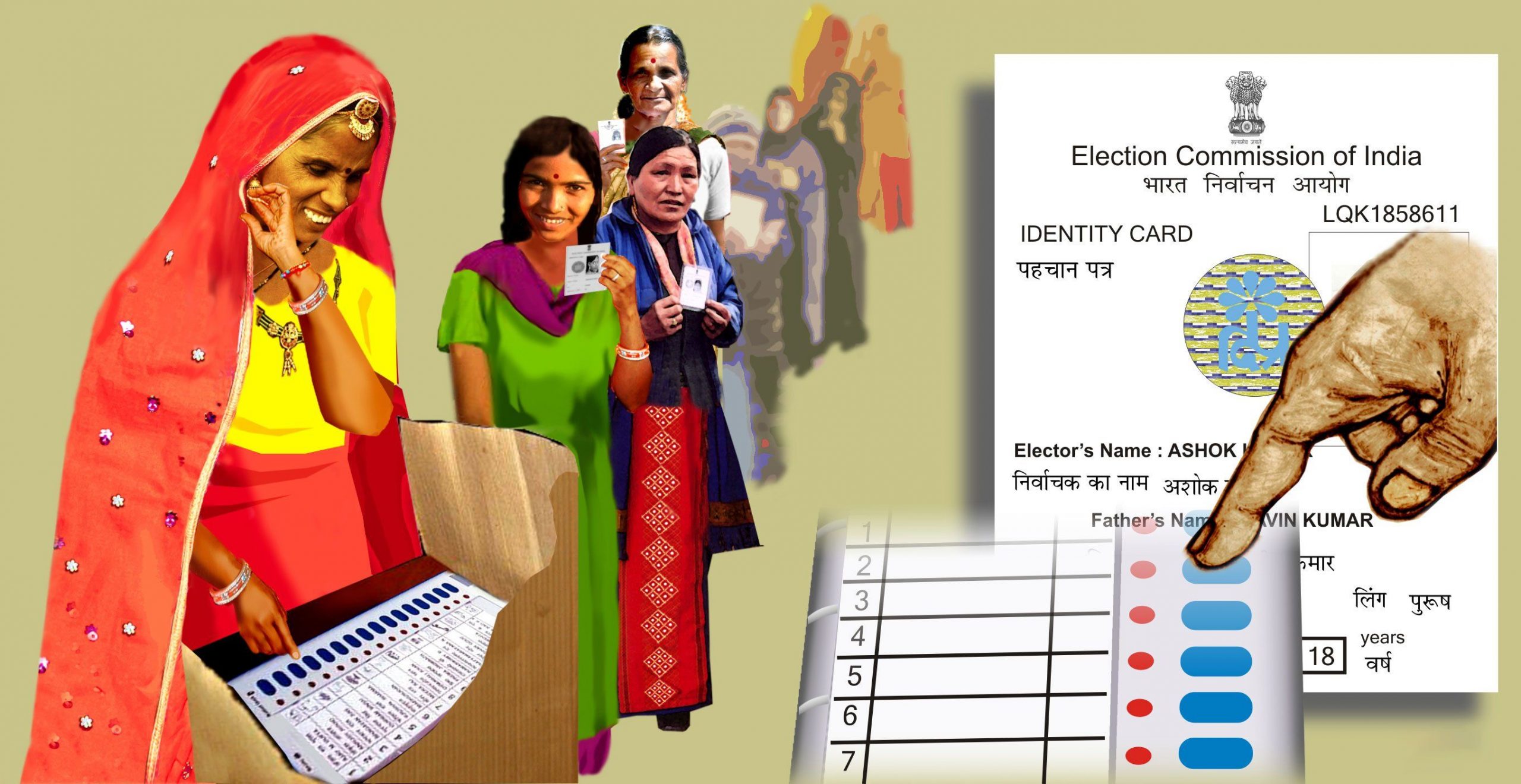As the Opposition walked out in protest, the Rajya Sabha on Tuesday passed The Election Laws (Amendment) Bill, 2021 by voice vote, allowing “the linkage of electoral roll data with the Aadhaar ecosystem.” On Monday, Lok Sabha passed the bill.
Also read: Parliament’s winter session adjourned sine die ahead of schedule
What is the government’s justification for pushing this bill forward?
According to the government, the Bill comprises a number of long-debated election reforms.
The government claims that linking Aadhaar to electoral records will eliminate duplicate enrolments of the same person in different places. “Once Aadhaar is linked, the electoral roll data system will immediately flag the presence of previous registration(s) anytime a person requests for a new registration.” According to a government official, this will greatly assist in cleaning the electoral record and facilitating voter registration in the location where they are ‘ordinarily resident.’
“The Committee has been advocating linkage of unique Aadhaar ID Card number with voter I-card which would streamline alterations in EPIC during change of ordinary residence by the electors,” according to a Parliamentary Standing Committee report on the Law Ministry’s demands for grants, which was presented in Rajya Sabha on March 6 this year. Multiple entries could also be eliminated, which is necessary in participatory democracy…”
Law Minister Kiren Rijiju remarked in Parliament that attaching Aadhaar to the voter ID card is “optional.” It is neither obligatory nor mandatory.” Before the Bill was introduced, he stated the administration had “several meetings” with the Election Commission.
Also read: Mamata Banerjee hails ‘landmark victory’ as TMC leads Kolkata Civic Polls
What were the topics of these debates?
The Election Commission launched a National Electoral Roll Purification and Authentication Program in March 2015, with the goal of linking Aadhaar to voter IDs and removing duplicate names. “Under this programme, apart from certain other operations, linking and authentication of EPIC data of electors with Aadhaar data is also being done,” the EC said in a release in May 2015. The EC, on the other hand, had “given required directions to the Chief Electoral Officers (CEOS) of the States/UTs clarifying that electors’ provision of Aadhaar numbers is not mandatory and is merely optional, as directed by the Supreme Court…”
“The Aadhaar card Scheme is absolutely optional and it cannot be made mandatory until the question is fully decided by this Court one way or the other,” the Supreme Court stated that year.
The EC wrote to the Law Ministry in April this year, requesting “rapid consideration” of pending election reforms, including the linking of Aadhar and voter ID cards. The Election Commission attended an informal interaction requested by the PMO on November 16 to finalise the Cabinet note on several long-pending reforms, according to a statement released by the Law Ministry earlier this week.
Also read: RSS condemns the Golden Temple incident, says perpetrators must face action
What are the objections of the opposition?
“The connection of voter IDs with Aadhaar breaches the fundamental right to privacy as established by the Supreme Court in the verdict,” said Congressman Manish Tewari.
Asaduddin Owaisi, an AIMIM MP, claimed that if the Bill becomes law, the government will be allowed to utilise voter identifying information to “disenfranchise some people and profile citizens.” “This Bill falls outside of this House’s legislative authority… “The integration of voter ID with Aadhaar breaches the Puttaswamy (case) fundamental right to privacy,” Owaisi said.
“The current legal provisions have significant disparities and some flaws,” Rijiju said. “To address these, the government, in conjunction with the Election Commission and integrating recommendations made by the Election Commission, has adopted these revisions.” He went over the proposed changes to the 1951 Representation of the People Act in detail.
Rijiju cited the 105th report of the Department-Related Parliamentary Standing Committee on Personal, Public Grievances, and Law and Justice, which stated that linking Aadhaar to electoral records will purify electoral rolls, reducing election malpractices.
Also read: CM Yogi Adityanath: After BJP, gangsters and criminals left state, not Hindus
Why might identifying names that occur on numerous rolls be a problem?
One of the worries is that if the linkage is not mandatory, the Bill’s implementation will fail. The bill modifies the People’s Representation Act of 1950 and the People’s Representation Act of 1951 to enact various election reforms.
A person may apply to the electoral registration officer for their name to be added to the voter list under the 1950 Act. According to the bill, an electoral registration officer may ask for a person’s Aadhaar number in order to verify their identification. If their name is already on the electoral list, the Aadhaar number may be required for validation of entries, however persons who are unable to show their Aadhaar cards will not be denied inclusion in the electoral roll or have their names removed.
“The first rationale presented is that fake voting is taking place, where one person is voting more than time,” Arghya Sengupta, founder and research director at Vidhi Centre for Legal Policy, stated. If you’re saying you have to bring it with you to the polls with your voter ID… This will only work if supplying an Aadhaar number is required. However, this aspect of the law is a little confusing since, while it appears to be voluntary, the reasons for which I might choose not to link my Aadhaar will be dictated by the government for sufficient cause.’ Now, what could that sufficient cause be if it isn’t stated in the bill?… This needs to be stated clearly.”
Also read: MP Jaya Bachchan loses cool, tears into BJP in Rajya Sabha
Are there any other issues to be concerned about?
Non-citizens would be able to vote if Aadhaar is linked, according to the opposition. “If you are in a position to ask for Aadhaar for voters, all you are obtaining is a document that represents domicile, not citizenship,” Congress MP Shashi Tharoor stated in the Lok Sabha. You’re potentially allowing non-citizens to vote.”
“This has also been mentioned in the House, that Nepalis and Bangladeshis will not be permitted to vote, and this will ensure that this does not happen,” Sengupta explained. Here’s where there’s a stumbling block… The Aadhaar Act expressly states that Aadhaar is not proof of citizenship. We all know that citizens are the only ones who can vote. Because non-citizens can have an Aadhar card, I’m not sure how this will prevent them from voting… Aadhaar will not achieve the purpose of banning non-citizens from voting.”
Another issue expressed by the CPI(M) in a statement is that the Bill could compromise vote confidentiality, undermining the notion of secret ballots and the voter’s fundamental right to privacy.
Also read: PM Narendra Modi transfers Rs 1,000 cr to bank accounts of SHGs
Is it possible to track individual votes in this manner?
“While individual identification of voting choices may not be achievable with Aadhaar-linked voter IDs, profiling will result,” stated Apar Gupta, Executive Director of the Internet Freedom Foundation. “The verification of a person’s identity is distinct from the identity capture that occurs in polling booths when a person votes. However, it may assist the government in connecting it to other services, allowing for the development of wider programmes based on the data…” “The other problem is that there has been a documented case of Aadhaar data being leaked,” he continued.
It has the potential to establish the groundwork for targeted political propaganda, which is also against the model code of behaviour.”
The Unique Identification Authority of India (UIDAI) filed a police complaint in April 2019 against IT Grids (India) Private Limited, a Hyderabad-based software company, accusing it of illegally obtaining the details of 7,82,21,397 Aadhaar holders in Andhra Pradesh and Telangana and storing them in its databases. Concerns were made about UIDAI servers’ potential security weaknesses, which the authority refuted at the time. Although the matter was handed to a special investigation team, no meaningful progress has been achieved.







